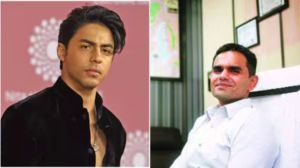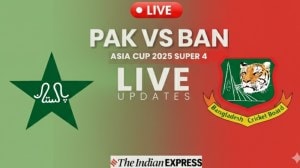It was japhis, Gurmukhi, and a hint of Kashmir
It’s a motley gathering of interested listeners. Some squatting on the floor, others leaning across the lone chair. The turbaned poet i...

It’s a motley gathering of interested listeners. Some squatting on the floor, others leaning across the lone chair. The turbaned poet is regaling them with couplets about how he managed to steal a drink even when he was in jail. As he finished, there was a clamour for more.
Among the many little impromptu conferences that went alongside the World Punjabi Conference, was one hosted by Mohamma Nisar Khusi, a poet from Sahiwal in Pakistan. A shawl draped across the shoulder, Khushi was a hit among students of Punjabi University. The show over, they rushed to touch his feet and reassembled when the media asked him a few questions about his poetry.
‘‘Yes there is anger and anguish in my poetry against the rich-poor disparity,’’ he remarks as he breaks off into another couplet, ‘‘ Jis kol char chawaniyan wadh gayeyan, hoya us da shan guman bahuta (If somebody has a few annas more, he gets more respect in society).’’ As the audience nods in agreement, one is reminded of this very university having been the hotbed of revolutionary Naxalite poetry during its heyday. ‘‘Strikingly similar,’’ remarks a student.
But the conference is all about bear hugs and celebrations. The word ‘World’ seems to have been thrown in deliberately, though it almost entirely revolves around Indo-Pak bonhomie.
But the K-word lurks under the surface. Tariq Aziz, the famous compere of Pak TV show Nilam Ghar, has about half the audience coming to shake hands and say, ‘‘Jawab durust hai ji, (The answer is right),’’ his answer to every right answer in his quiz show.
But there is another side to Aziz, one that he bares when he rakes up the Kashmir issue. ‘‘Azaadi is the birthright of every citizen,’’ he says as he talks of 80,000 Kashmiris having being killed. Aziz came to India in 1971 along with then Pakistan premier Z.A. Bhutto, and visited Delhi a decade later for a trade fair. On his first visit to Punjab, he is critical of the vulgarity on television. ‘‘It is tolerable in films, but the television invades your bedroom,’’ says the veteran.
A hint of anguish of a different kind is evident in a conversation with Dr Rashid Mateen as well. His parents were from Patiala, and his grandfather was a SP in the police. Ten of his family members were killed as he was about to visit Patiala for the first time.
His elderly uncle, who is also visiting the city for the first time, blinks away tears at the mere mention of his former hometown. ‘‘I have gathered the route to my ancestral home. It is near Islamia College grounds close to the Sheranwala Gate,’’ he says. His father taught Gurmukhi in a school in Patiala and his regret is that in India, Punjabi has changed. ‘‘This was not the Punjabi that my parents knew,’’ Dr Mateen remarks.
This is also attested by Asar Chauhan, editor of Siyasat, who feels that while Punjabi has acquired a Persian touch in Pakistan, it is bending towards Sanskrit in India. ‘‘And for God’s sake, do not call our script Shahmukhi,’’ Chauhan pleads. Gurmukhi came from the utterances of the Gurus, and Persian script has nothing to do with Shahs. And yes, Guru Gobind Singh wrote Zafarnama in Persian, he says.
As the technical conferences talks of differences in language and script, at the massive lunch hosted by the university, a ‘‘halal counter’’ has been created to cater to the tastes of the visitors. Differences are apparent and would remain, but the special counter shows the spirit of accomodation is very much in place.



- 01
- 02
- 03
- 04
- 05




























